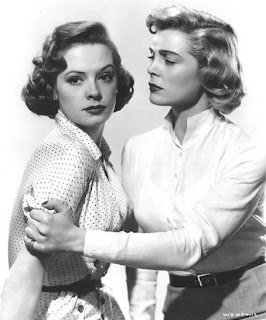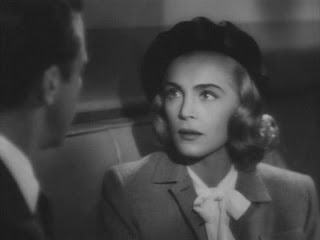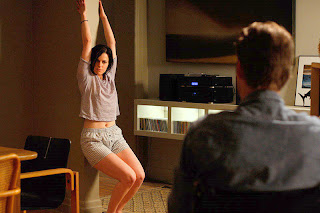 Jane Greer and Lizabeth Scott in " The Company She Keeps" (1951)
Jane Greer and Lizabeth Scott in " The Company She Keeps" (1951)"Confidential published allegations that Scott had solicited sex from lesbian call girls. She was linked to Parisian “madame” Frede, whom Marlene Dietrich had befriended; the publisher, Robert Harrison, indulged in a little “sexual Darwinism” by assigning Scott to the legion of so-called “baritone babes” who engaged in such subversive activities as wearing pants.
 Lizabeth Scott did not conform. She valued her freedom and independence. She found the ways of the patriarchy to be stifling, and moved on with her life —a very personal life— just as soon as her contractual obligations had been fulfilled. Her silence regarding that life dovetails back to the duality that intrigued her from an early age —the forced dichotomy between a woman’s mind and heart, and the ongoing conflict about the ownership of a woman’s body and soul.
Lizabeth Scott did not conform. She valued her freedom and independence. She found the ways of the patriarchy to be stifling, and moved on with her life —a very personal life— just as soon as her contractual obligations had been fulfilled. Her silence regarding that life dovetails back to the duality that intrigued her from an early age —the forced dichotomy between a woman’s mind and heart, and the ongoing conflict about the ownership of a woman’s body and soul. Too beautiful to be taken seriously, too unusual and odd to be accepted solely as eye candy, Lizabeth Scott embodies the tension that already existed in sexual politics in America in the 1940s and 50s —a tension that has still yet to be resolved.
Too beautiful to be taken seriously, too unusual and odd to be accepted solely as eye candy, Lizabeth Scott embodies the tension that already existed in sexual politics in America in the 1940s and 50s —a tension that has still yet to be resolved. Dick Powell, Lizabeth Scott and Raymond Burr in Pitfall (1948) directed by André de Toth
Dick Powell, Lizabeth Scott and Raymond Burr in Pitfall (1948) directed by André de Toth “Life is a betrayal. And sometimes you betray yourself too, you know. Let’s have the guts to admit it. There isn’t anybody born here lately who didn’t play dirty sometime, somewhere in his life. So why do you hide it? Truth, honesty, that’s my key [to] filmmaking.” -André de Toth, quoted in "A Personal Journey through American Movies with Martin Scorsese" (1995)
“Life is a betrayal. And sometimes you betray yourself too, you know. Let’s have the guts to admit it. There isn’t anybody born here lately who didn’t play dirty sometime, somewhere in his life. So why do you hide it? Truth, honesty, that’s my key [to] filmmaking.” -André de Toth, quoted in "A Personal Journey through American Movies with Martin Scorsese" (1995) For that reason and several more, her performance in Pitfall will continue to resonate as one of the most eloquent, realistic portrayals of “woman’s fate” in American society" -"Lizabeth Scott: Noir's Quicksilver Anti-Heroine" by Anastasia Lin (Special to the Sentinel, 2010)
For that reason and several more, her performance in Pitfall will continue to resonate as one of the most eloquent, realistic portrayals of “woman’s fate” in American society" -"Lizabeth Scott: Noir's Quicksilver Anti-Heroine" by Anastasia Lin (Special to the Sentinel, 2010) "Juliette Lewis - one of the more interesting actresses out there - might have concentrated a lot on her music career over the last few years with her band Juliette and the Licks and then The New Romantiques but that doesn't stop her from taking on more film roles all the same.
"Juliette Lewis - one of the more interesting actresses out there - might have concentrated a lot on her music career over the last few years with her band Juliette and the Licks and then The New Romantiques but that doesn't stop her from taking on more film roles all the same. Sam Rockwell holds Juliette Lewis on 5th October 2010
Sam Rockwell holds Juliette Lewis on 5th October 2010The Hollywood Reporter has the news that Lewis has signed on to star in contemporary film noir Blood or Water, from Scottish director Justin Molotnikov. She joins the cast which includes Stephen McCole (Stone of Destiny), Katie Dickie (Red Road), Gary Lewis (Billy Elliot) and Greta Scacchi (The Player).
 Lewis had this to say:
Lewis had this to say:"I am excited by Justin Molotnikov's unconventional, completely organic approach to storytelling and filmmaking... He creates one of a kind, totally engrossing stories with characters that jump off the screen." Source: twitchfilm.com
 Still of Emily Hampshire as Louise in Good Neighbours (2010)
Still of Emily Hampshire as Louise in Good Neighbours (2010)Good Neighbors is not at all the movie I expected it to be. Don't be scared off by that, though; I mean it in the best way possible. Good Neighbors instead draws its inspiration from film noir and the like, bringing Blood Simple in particular to mind, and compliments don't get much higher than that. The construction of the movie is flawless. No detail is inconsequential, and writer/director Jacob Tierney weaves it all together so brilliantly that everything you've seen and heard remains etched in your mind. He doesn't need to resort to flashes from earlier in the film to remind you what the clues were. He doesn't need to bother with monologues or heavy-handed exposition. Gifted storytellers have no use for those sorts of crutches. The whodunnit? element is basically a means to an end.
 Still of Scott Speedman, Jay Baruchel and Emily Hampshire in "Good Neighbours" directed by Jacob Tierney
Still of Scott Speedman, Jay Baruchel and Emily Hampshire in "Good Neighbours" directed by Jacob TierneyGood Neighbors takes that in a direction that makes perfect sense in the context of who these people are, and it's something so inspired and so fucked-up that you'll never see it coming. Even then, the movie keeps building and building on top of that, staying intelligent and respectful all the way but always steering clear of whatever it is you might be expecting. Like the best works of noir, there are no heroes. There are no villains.
 Most everyone is instead a darker shade of gray in between, and wait'll you see how the film wrangles in its femme fatale. Source: www.dvdtalk.com
Most everyone is instead a darker shade of gray in between, and wait'll you see how the film wrangles in its femme fatale. Source: www.dvdtalk.com Still of Sam Riley and Andrea Riseborough as Pinkie Brown and Rose in Brighton Rock (2010)
Still of Sam Riley and Andrea Riseborough as Pinkie Brown and Rose in Brighton Rock (2010)"Oh those bad boys. A mousy waitress in a British resort town is drawn to a minor-league thug, and she won't heed her boss's warning that he's no good. That's the crux of "Brighton Rock" a stylish film noir remake of a 1947 film based on Graham Greene's 1938 novel. Writer-director Rowan Joffe has set it in the '60s, so there are numerous mod references.
 Despite what his name might imply, Pinkie Brown is a ruthless low-life who kills a rival gang leader out of revenge. We understand that nothing good will come of this. Sam Riley ("Control") is convincing as the strange young man who is desperate to not be found out, so when the dowdy young thing could possibly finger him for the murder, he starts wooing her.
Despite what his name might imply, Pinkie Brown is a ruthless low-life who kills a rival gang leader out of revenge. We understand that nothing good will come of this. Sam Riley ("Control") is convincing as the strange young man who is desperate to not be found out, so when the dowdy young thing could possibly finger him for the murder, he starts wooing her. An appealing Andrea Riseborough ("Never Let Me Go") is the good Catholic girl who refuses to believe Pinkie has ulterior motives.
An appealing Andrea Riseborough ("Never Let Me Go") is the good Catholic girl who refuses to believe Pinkie has ulterior motives. In a supporting role, Helen Mirren plays Ida, owner of the tea room where Rose works. She suspects what Pinkie is up to, and won't stop from exposing the psychopath. The venerable John Hurt shows up as a bookie, and they both lend class to the rather glum proceedings.
In a supporting role, Helen Mirren plays Ida, owner of the tea room where Rose works. She suspects what Pinkie is up to, and won't stop from exposing the psychopath. The venerable John Hurt shows up as a bookie, and they both lend class to the rather glum proceedings. Handsomely shot, "Brighton Rock" boasts breathtaking scenic views, with moonlit nights as attractive as a stroll on Brighton's pier. When dark is called for, the moodiness and shadows are evocative, and melancholic music punctuates a string-heavy score". Source: www.bnd.com
Handsomely shot, "Brighton Rock" boasts breathtaking scenic views, with moonlit nights as attractive as a stroll on Brighton's pier. When dark is called for, the moodiness and shadows are evocative, and melancholic music punctuates a string-heavy score". Source: www.bnd.com













No comments :
Post a Comment